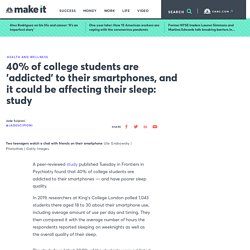

Therefore, the presence of their parents, or a guardian, is crucial at this time.
Rebellion usually occurs at the early stage of adolescence. Early adolescence may start rebelling and displaying unacceptable behaviours.
Parents can decrease or increase behaviour by presenting consequences. Teenage children will learn through the consequences of their behaviour, and this type of learning is called operant conditioning.
What is Operant Condition?
BF Skinner: Operant Conditioning. Operant Conditioning - Skinner box experiment - VCE Psychology.
Reinforcement Vs Punishment. Reinforcement & Punishment. Skinner’s Operant Conditioning: Rewards & Punishments. The Use of Reinforcement and Punishment in Shaping a Child's Behavior.
Positive & Negative Reinforcement/Punishment in the Classroom. 7 Ways To Discipline Your Child. Misconduct due to prolonged use of smartphones. References. College students 'addiction' to smartphones may affect sleep: study. A peer-reviewed study published Tuesday in Frontiers in Psychiatry found that 40% of college students are addicted to their smartphones — and have poorer sleep quality.

In 2019, researchers at King's College London polled 1,043 students there aged 18 to 30 about their smartphone use, including average amount of use per day and timing. They then compared it with the average number of hours the respondents reported sleeping on weeknights as well as the overall quality of their sleep.
The study found that 38.9% of the students were addicted to their smartphones. Of those with an addiction, 68.7% had poor sleep quality, compared to 57.1% of those who did not have an addiction. Researchers found students who used their phone several hours during activities with family or friends and after midnight were most likely to be at high risk of becoming addicted. Positive Punishment. Negative Punishment. Positive Reinforcement. Negative Reinforcement. References.